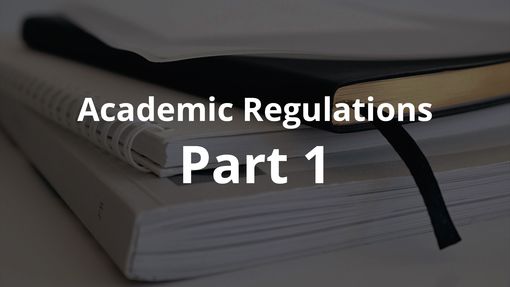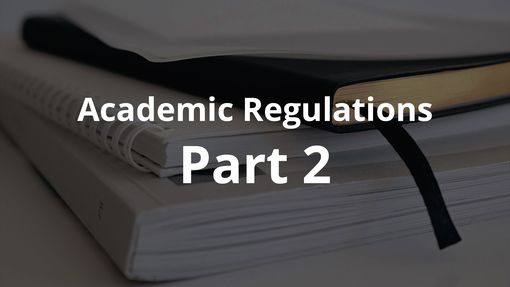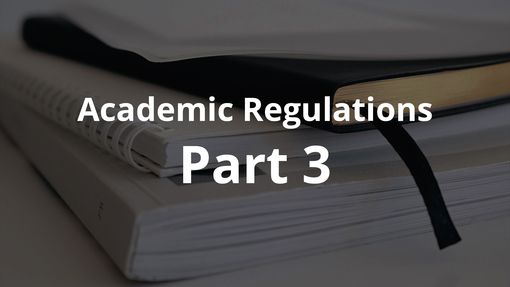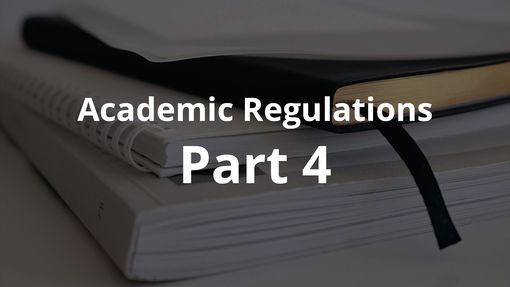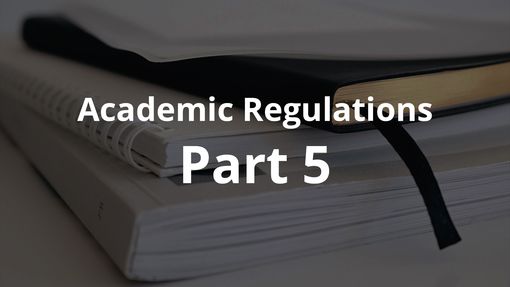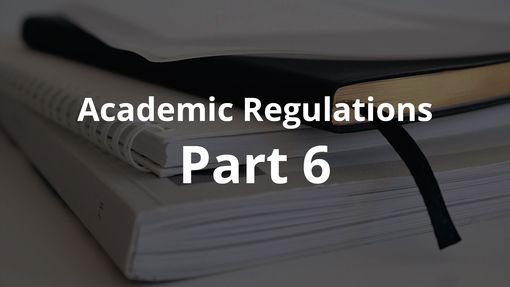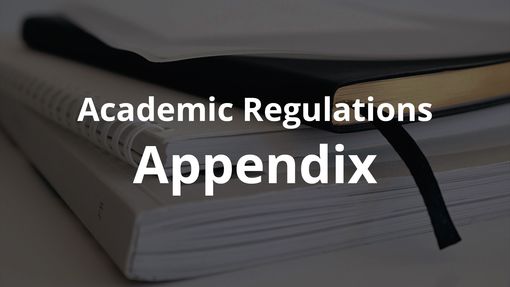Academic Regulations Part 2: General Regulations
Contents
- Admissions and Student Recruitment
- Accredited Prior Learning (APL)
- Registration and Enrolment
- Change of Name and Equity Membership
- Communications from the School of University of London
- Unit Enrolment
- Break In Studies and Permanent Withdrawal
- Exclusion and Termination of Registration, and Attendance
- Supplementary, Short Courses, Exchange and Intercollegiate Study
- Disabled Students
- Intellectual Property
1. Admissions and Student Recruitment
Introduction
1.1 The admissions process for each higher education programme is published on the School’s website.
1.2 All applicants will be covered by the School’s equal opportunities policies.
Selection Criteria and Minimum Entry Requirements
1.3 The minimum/normal entry requirements are published as part of the Programme Specification which is approved as part of the validation process (see the School’s Handbook of Quality Assurance and Enhancement) for the course and is also published on the website, in the prospectus and on the UCAS website. All applicants accepted on to a course are normally expected to be able to meet the minimum/normal entry requirements. In accordance with the School’s equal opportunities policies, the same minimum/normal entry requirements are required for all applicants for the same course.
1.4 Selection criteria will cover the abilities, aptitudes, skills, qualifications (including English language proficiency) and experiences of applicants that indicate their potential to succeed on each course. Selection for interview/audition is based on an applicant’s personal statement, academic reference(s) and academic profile. Selection for admission is based on further consideration of an applicant’s abilities, aptitudes, skills and potential to succeed on each course at audition/interview. For most courses at the School admission is competitive and offers are made to those applicants who perform most highly at interview/audition and are judged to have the highest potential.
English Language requirements
1.5 All minimum/normal entry criteria should include a minimum English language requirement which may be met through GCSE qualifications grade C or equivalent or through an IELTS test score 7. The standard of English required for entry should be equivalent to that necessary to successfully complete the course, unless English skills are included among the learning outcomes for the course or additional tuition and support in English is going to be provided.
Admission of Students on to Taught Courses of Study
1.6 The School admits students on the basis that a student fulfils the entrance requirements for admission to the applied course of study as stated in the appropriate Programme Specification as well adhering to the School and University of London admissions regulations; and that
a) there is a reasonable expectation that the applicant will achieve the standard required for the award;
b) there will be equality of opportunity for all applicants.
Admission to Research Degrees
1.7 The School admits students to the research degree programme on the basis that:
a) applicants would normally have an undergraduate degree and Masters degree in relevant subjects. In exceptional circumstances applicants may have significant and relevant professional experience in place of a masters qualification. Applicants proposing to undertake research that includes practice-based elements will normally be expected to be able to demonstrate appropriate experience and proficiency in relevant areas of practice.
b) there is a reasonable expectation that the applicant will achieve the standard required for the award; and that
c) there will be equality of opportunity for all applicants.
d) applicants will normally be admitted as ‘MPhil/PhD’ students in the first instance and will upon successful progress transfer to PhD registration.
Entry by Advanced Standing
1.8 Students with a Postgraduate Diploma may apply to enter directly into the final term of an MA course to undertake the 60 credit Sustained Independent Project (SIP) unit for the award of a MA. The 120 credits gained from the Postgraduate Diploma will be awarded as APCL credits (see Section 2, below). The School may require students to undertake additional units before commencing the SIP (e.g. units concerning research methodology).
1.9 The School will exceptionally permit students to enter directly into the second year of a MFA course if they hold a MA or Postgraduate Diploma in an appropriate field. 120 credits will be awarded as APCL credit.
2. Accredited Prior Learning (APL)
Introduction
2.1 The School may, at its discretion, recognise for academic purposes prior certified or experiential learning. This recognition may give the prior learning a credit-value and permit it to be counted towards the total number of credits required for an award.
2.2 Students can apply for credit of accredited prior learning (APL) for one or several units.
2.3 The application process for accredited prior learning is published in the Admissions Handbook.
2.4 The award of APL is not a student right, just as the offer of a place on a course of study even when an applicant is appropriately qualified is not a right. There is therefore no Appeal system.
2.5 The School can impose conditions when approving an application for admission with APL. These may include:
- candidate could be required to take an alternative unit to the unit from which they are to be exempted (either as an assessment or on an attendance basis);
- the institution might require as a condition of entry that a successful candidate undertakes an additional programme of study or period of work experience (assessed or otherwise) outside of the School prior to their time on the course;
- subject to another course’s agreement, a student might be required to undertake (assessed or otherwise) part of another comparable course where this would enable them to fill in any perceived ‘gaps’.
2.6 The credits awarded shall be termed either Accredited Prior Certified Learning (APCL) or Accredited Prior Experiential Learning (APEL).
2.7 The term accredited prior learning/APL without limitations shall refer to both APCL and APEL.
2.8 Programme Specifications will state if applications for APCL and/or APEL are considered.
2.9 APCL credits should be for previously assessed and certificated learning recognised for academic purposes from another Higher Education institution.
2.10 APEL credits should be for learning achieved outside education or training systems that is relevant to the registered course of study.
2.11 The award of APL credit can permit the student to begin part way through the course by ensuring that the period of study they have missed (e.g. by not starting in the first year) is accounted for in terms of credit.1
2.12 There are, however, a maximum number of credits that may be credited towards the award from study elsewhere:
a) Certificate of Higher Education: 60 credits
b) Diploma of Higher Education: 120 credits
c) Honours degree: 240 credits (minimum of 120 credits at level 6 (H) must have been studied
d) Postgraduate Certificate: 20 credits
e) Postgraduate Diploma: 60 credits.
f) Master of Arts: 60 credits.
g) Master of Fine Art: 120 credits, exceptionally (refer to 1.9 above).
2.13 Credit may be awarded either for a specific named unit or as “un-specified credit” which shall be a total value of credits at a specific level of study e.g. 120 credits at Level 4.
2.14 Students transferring onto a course of study would normally be awarded unspecified credit for the year(s) they have missed, though if appropriate they may be given credit for specific named units.
2.15 All credits awarded as accredited prior learning shall be recorded as a “Passed Unit”.
2.16 APL credits may count towards the number of credits needed for the award. APCL credits may be used towards the classification of an award, but only where a mark has been agreed as part of the APCL application.
2.17 APEL credits shall not be included in the classification of award (i.e. first, lower second, merit, distinction etc).
2.18 APL credits from another institution may be used towards the degree if the credit has been awarded within the previous 5 years.
2.19 APL credits must be at the same or higher level than those being applied for exemption, i.e. a level 4 unit taken at another institution cannot count towards a level 5 unit at the School. However, a level 5 unit could be used in lieu of credit at level 4 etc.
2.20 University Ordinances require that provisions for students to transfer with credit into University of London first degrees shall ensure that the minimum period of study in the School shall normally be not less than two years full-time (or the part-time equivalent); and that in no case shall the minimum period be less than one year full-time (or the part- time equivalent), that year being the final year of the degree course and such cases to be regarded as exceptional and subject to special consideration by the School.
2.21 Acceptability for credit transfer of work undertaken in other institutions within or outside the University of London does not confer right of entry to any course in the School. Decisions on admission, including decisions on crediting previous periods of study, remain at the discretion of the School only.
1Otherwise students will reach the end of the course without accumulating sufficient credit to be entitled to their target award. For example, a student who transfers directly into the second year of an undergraduate degree course could, without APL credits be short of the 120 credits that would have been studied in the first year.
Accredited Prior Certified Learning (APCL)
2.22 APCL Credit may be awarded for previous learning on a course leading to an appropriate and nationally recognised qualification at a level commensurate with the stage of the course applied for providing:
- The course may have been completed successfully either partially or in its entirety.
- The content and learning outcomes of the earlier course should be shown to correspond clearly to the elements of the course applied for and for which academic credit is sought.
- The student will have an award certificate or (for a non-completed course) a Credit-Rating certificate or a Statement of Achievement (transcript) issued by the institution involved.
- The learning must have taken place in the last five years.
Accredited Prior Experiential Learning (APEL)
2.23 Academic Credit may be awarded for relevant learning, knowledge and skills acquired through life, work, private study or non-certificated courses that equate - at the appropriate level - to the intended learning outcomes of the course elements for which credit is sought.
2.24 Applicants for APEL must normally be over 21 years of age.
2.25 Evidence for APEL might include:
- a portfolio of extant work
- references from previous employers
- further external evidences (e.g. press cuttings)
- specially submitted work (e.g. essays, artefacts).
Double counting and award revocation
2.26 Double counting occurs where credit that has contributed to an academic award (whether at Central or another higher education provider) at the same level is used for the purposes of APL. Double counting is not normally permitted.
2.27 Students who have accepted an exit award from Central and who subsequently re-enrol at the School with the intention of obtaining a higher award will have their exit award rescinded. For example, a student who has exited a BA programme with a Certificate of Higher Education after their first year will only be permitted to re-enrol in order to recommence their BA if they agree to have their Certificate of Higher Education rescinded.
2.28 The exit award will only be formally rescinded once the student has successfully completed the requirements of the higher qualification. If the student subsequently exits the programme without having obtained the higher qualification, the original exit award will stand.
3. Registration and Enrolment
Categories of Registration
3.1 Applicants admitted to the School shall be registered as one of the following categories:
- Undergraduate Students: following a course of study leading to an undergraduate award of either Certificate of Higher Education, Diploma of Higher Education, or Bachelor of Arts with Honours.
- Exchange Students: following a predefined study arrangement between the School and an overseas institution of higher education. The student may be entitled to the award of credits but not an award of the School. The student will be registered for an award at another institution.
- Postgraduate Taught Students: following a course of study leading to the award of either Postgraduate Certificate, Postgraduate Diploma, Master of Arts or Master of Fine Art.
- Research Students: following a research degree programme to the award of Master of Philosophy or Doctor of Philosophy. Research students will normally be classed as “internal” students i.e. will fulfil the School’s regulations on residence, and in exceptional cases students may be registered as “External students” (see paragraphs 32.15-32.18 in the Research Degree Regulations).
- Intercollegiate (University of London) Students: students registered for an award at another member institution of the University of London but who are undertaking one or more units of study at the School. The students will be entitled to the award of credits but not an award of the School.
- Supplementary Unit Students: students not registered for a named award of the School or any other institution but who are undertaking one or more credit-bearing units of study at the School. The student is entitled to the award of credit only.
3.2 A student will not be permitted to register concurrently for more than one degree, diploma or certificate or for any combination of awards of this School.
3.3 It is not permitted to register as a student of the School whilst registered as a student for an equivalent or higher qualification of any other university or other institution.
Internal Course and Mode of Study Transfer
3.4 Students may transfer between one course or mode of study and another only with approval of both Course Leaders and the Academic Registrar. Applicants for internal transfer should use the form available in the Student Handbook.
3.5 Internal Course Transfer may be dependent upon the student undertaking additional units and/or assessments. Where too many credits have been accrued to enable a transfer between courses or modes of study and maintain consistent study intensity without break, applications shall normally be rejected.
3.6 Tuition fees and the length of the course may change as a result of an internal course transfer.
3.7 The transfer shall normally occur at the start of a term or course year.
3.8 Accredited Prior Learning may need to be awarded where the transfer occurs part way through the course. The Course Leader and Academic Registrar shall determine if any of the units undertaken on the previous course may be included as credit towards the award and whether any units on the new course need not be undertaken as a result.
3.9 Students are permitted a maximum of two transfers between courses or modes of study for the entirety of their period of registration.
Period and Mode of Student Registration
3.10 The individual Programme Specification shall state whether a course is available as part- time or through distance learning. Unless otherwise stated all courses are full-time only.
3.11 The individual Programme Specification shall specify what the minimum period of registration on the course shall be. This shall comply with University of London Ordinances and Regulations on the minimum period of study required for the award in question.
3.12 The normal period of time to complete a course of study is 3 years (full-time Bachelors’ degrees), 1 year (full-time, Masters degrees; 2 years part-time), 2 years (full-time, Master of Fine Art degrees), and between 3 and 4 years (full-time, Research degrees; between 6 and 8 years part-time).
3.13 The following details the maximum period2 which a student may be registered on a course from the time of their first enrolment on the course (not including any period of suspension):
| Undergraduate Courses | Full-time | Part-time |
|---|---|---|
| Certificate of Higher Education: | 2 | N/A |
| Diploma of Higher Education: | 4 | N/A |
| Bachelors’ Degrees (BA): | 6 | N/A |
| Postgraduate Courses | Full-time | Part-time |
|---|---|---|
| Postgraduate Certificate: | 2 | 4 |
| Postgraduate Diploma: | 2 | 4 |
| Masters degrees: | 2 | 4 |
| Research Degrees | Full-time | Part-time |
|---|---|---|
| MPhil | 5 | 10 |
| PhD | 5 | 10 |
3.14 Exchange, Intercollegiate, Short Course and Supplementary Unit students shall remain registered with the School for the duration of the courses/unit(s) being studied only.
3.15 If a student reaches the end of the maximum period of registration without completing the award for which they registered the student’s registration shall be terminated. An intermediate award (if the student is eligible) may be awarded at the discretion of the Examination Board.
2The maximum period includes the potential extra time required should a student be unable to progress in each year of the course.
Definition of Full-time status
3.16 A student is defined as being full-time if they are studying on a course that is a minimum of 24 weeks long and undertake a minimum of 21 hours per week of study. The 24 weeks of study does not include any vacation periods. The 21 hours per week includes both teaching and directed independent study time.
Extension of the maximum period of registration
3.17 A student’s period of registration may only be extended beyond that stated in section 3.12 (above) through successful application to the Examination Board (for students on taught programmes) or the Research Degrees Sub-Committee (for research candidates), for which significant Mitigating circumstances endorsed by the Mitigating Circumstances panel would be required. The maximum period of registration may only be extended for a period of one academic year, after which the student will be withdrawn from the course. An intermediate award (if the student is eligible) may be awarded at the discretion of the Examination Board.
Registration
3.18 All new students (including Exchange and Intercollegiate students) must register at the start of their first year of the programme and if they successfully progress at the start of each subsequent academic session thereafter for the duration of the programme.
3.19 Registration normally constitutes the confirmation of the programme and course to be studied, declaration and acceptance of the terms and conditions of registration for the academic session (including dates of study), plus:
- Academic registration
- online registration task to update personal details
- identification check
- highest academic qualification check
- any UK Visas and Immigration (UKVI) right to remain checks necessary for the course
- any Disclosure and Barring Scheme (DBS) checks necessary for the course
- Financial registration
- Tuition fee payment, sponsorship, bursary or loan check
3.20 Registration occurs once only at the beginning of the programme of study. It is then continued by students on programmes with multiple courses that extend beyond the anniversary of their original registration.
3.21 Continuing students must continue their registration for each subsequent academic session thereafter for the duration of their programme.
3.22 Continuing registration normally constitutes the confirmation of the course to be studied, declaration and acceptance of the terms and conditions of registration for the academic session (including dates of study), plus:
- Academic registration
- online registration task to update personal details
- Financial registration
- Tuition fee payment, sponsorship, bursary or loan check
3.23 All students must abide by the registration procedure published by the School and must register to the satisfaction of the School as stated in the registration information sent to students.3
3.24 Students who do not complete their registration by the start of their course are given temporary registration status. They receive full student status but are normally given four weeks to resolve their registration.
3.25 Students with temporary registration status are expected to fully engage with the course, attend all scheduled classes and other timetabled events of the course and submit and attend all assessments of the course.
3.26 Students who, without explanation have neither fully registered nor taken a break in studies (where possible) by the end of their temporary registration period in the academic session shall be excluded (failure to complete academic registration) or de-registered (failure to complete financial registration) from the course.
3Failure to register properly will affect a student’s status including their ability to claim and receive Government or School funding, the use of School and University of London facilities including library and computing services, enrolment of units, submission of and attendance at assessment, the provision of references, council tax certificates, results/transcripts and any other official confirmation of attendance and registration or the conferment of an award and the issuing of an award certificate.
Visas
3.27 Students who have not complied with the requirements of UK Visas and Immigration and any other legal requirements for entry into and study within the United Kingdom will not be fully enrolled on the course and could be suspended pending the appropriate visa documentation being obtained or even permanently withdrawn from the School.
3.28 Students should ensure that they apply for a visa extension should their progress on the course be such that they would not complete within the time granted on their visa.
3.29 Students should be aware that visas may not encompass the date of the graduation ceremony.
Disclosure and Barring Scheme (DBS)
3.30 Applicants will be informed of any requirement to undergo a Disclosure and Barring Scheme (DBS) check.
3.31 The School’s policy and procedure for the DBS is published in the document: Disclosure and Barring Service Policy and Guidance for students and staff.
3.32 Non-compliance with the policy may result in the student being required to suspend their studies until such a time as the School is satisfied or to permanently withdraw from the course.
3.33 All DBS checks will be Enhanced Disclosures.
3.34 Any course requiring a DBS check as part of registration and enrolment should state this in the Programme Specification, prospectus and on the website.
3.35 Any unit that incorporates placement learning with vulnerable groups or children as a requirement should state this in the unit outline and state that a satisfactory DBS check is a pre-requisite to undertaking this unit of study.
3.36 Any course undertaking regulated activity that would prevent a barred person from undertaking the course should state this in the specification, prospectus and on the website.
3.37 If placement learning is not a formal requirement of a unit but a student opts to undertake a placement informally as part of their learning, course leaders must take responsibility for ensuring that, when appropriate, a DBS check is completed beforehand and any DBSs with disclosures are forwarded to the DBS panel (as outlined above) before any informal placement activity begins.
3.38 Students must ensure that they inform the School of any change in their barred status or any occurrence that may affect their status as outlined in the DBS disclosure given to the School. Failure to do so will result in disciplinary action which may result in the student’s exclusion from the School.
3.39 Any DBS with a disclosure will be scrutinised by the DBS panel comprising:
- Academic Registrar (chair)
- Head of Student Support Services
- Programmes Office Manager
- Relevant Course Leader and/or Admissions Tutor
- Placements Officer
3.40 The Panel will determine whether any actions or adjustments may need to be taken as a result of the disclosure.
3.41 The Panel will choose whether they need to discuss in person or electronically. It is anticipated that it will be an electronic discussion except for the most serious of cases as determined by the Academic Registrar. The Academic Registrar as Chair will determine whether it is necessary for the Panel to interview the student.
3.42 Actions and Adjustments that the Panel might take as a result include:
- Requiring suspension pending further clarification
- Exclusion from the course (if on the barred list and activity with children or vulnerable adults is a compulsory component of the course)
- Require alternative placement arrangements or additional measures put in place.
3.43 Students on courses requiring a DBS check must provide an updated DBS when they resume after suspension or re-enrolment will not be permitted.
3.44 Failure to disclose information to the School that jeopardises the functioning of a placement opportunity or brings into disrepute the School’s reputation with a placement provider may be pursued via the School’s Student Disciplinary Procedures and could lead to exclusion.
4. Change of Name and Equity Number
4.1 Students are responsible for ensuring that their correct name is recorded accurately by the School, and should advise of any errors or change of name before registration. If a student changes their name during their studies, they must advise the School accordingly and provide documentary evidence of the name change. For example, students who have married since first registering at the School should provide a copy of their marriage certificate should they wish to have their name on School records formally changed.
4.2 Trans students may request in writing to the Student Advice Service that their name as it appears on School records, including Student Card and e-mail address, be changed to reflect their acquired or desired gender in advance of a formal legal name change. It is expected that a copy of any legal name change would be provided to the Student Advice Service by the student before the end of study on the course.
4.3 Students who adopt a professional name with a trades union or professional membership organisation may inform the School of this; however all official records will remain under the student’s legal name. On written request and submission of proof to the Student Advice Service, a new e-mail address with the student’s professional name will be set up by the IT Department. ID cards will not be changed.
4.4 Degree certificates are legal documents, and provide a factual account of the outcome of Examination Board deliberations. The School will therefore only consider reissuing degree certificates in exceptional circumstances: for example, where a change of name is associated with gender transition, or where a new name has been adopted for reasons of personal safety (in cases of victim or witness protection). Requests for degree certificates to be reissued in a new name should be made to the Academic Registrar and Director of Academic Services, and should be accompanied by appropriate documentary evidence (for example, a police report or solicitor’s letter) and legal proof (for example, a statutory declaration of name change or a birth certificate).
5. Communications From The School of University of London
5.1 Communications sent from the School or University of London to an individual student must be regarded as applying to that student only.
5.2 Students must ensure that they keep the School informed about any change in their contact details. The majority of notifications will be sent to student’s School e-mail address. It is the student’s responsibility to regularly check their School e-mail account.
5.3 In the event that lectures, seminars or any other activity needs to be cancelled or rescheduled the School will make every effort to notify students in advance, normally via their School e-mail account. This will normally be not less than 24 hours before the scheduled event, however circumstances beyond the School’s control may inevitably mean that students are informed of rescheduled or cancelled classes with less than 24 hours’ notice.
6. Unit Enrolment
6.1 Enrolment normally constitutes the confirmation of a student on a unit of assessment.
6.2 All students are responsible for ensuring that they are enrolled for the correct units for the current academic session by the published deadline.4
6.3 The minimum volume of taught study for students registered as either undergraduate students or as postgraduate taught students permitted in an academic year will normally be 20 credits.
6.4 The maximum volume of taught study (not including units of independent study such as a sustained independent project that span two academic sessions) that may normally be permitted for a part-time student in one academic year is 90 credits.
6.5 The maximum volume of study that may be permitted for a full-time student in one academic year is 120 credits at undergraduate level and 180 for Masters students.
6.6 The School cannot guarantee that a student will be entered for their assessment(s) if not registered and enrolled by the stated deadline.
4Any option unit must be selected by the student. The Programmes Office will inform students how and when to select option units as appropriate. Core units and re-assessments do not need to be selected by the student as this is done automatically by the Programmes Office and the student records system.
7. Break In Studies and Permanent Withdrawal
Break in Studies
7.1 The School’s Break in Studies Procedures set out the process by which students can apply for a Break in Studies. The maximum period that a student can break their studies for is two years for students on taught programmes, and one year for students on research programmes.
Break in Studies and Assessments
7.2 Students who have submitted assessments during the academic year up to the point of suspension shall receive marks awarded for those assessments already submitted. Mitigating Circumstances claims must be submitted if the student was unable to attend or submit assessments up to the point of suspension or if any assessments before suspension were affected by such circumstances. A break in studies will not be approved unless these mitigating circumstances are upheld by the Mitigating Circumstances Panel.
7.3 Students will be deregistered from any units that commence after the point of suspension.
7.4 Any outstanding assessments on units already commenced that are due for submission/attendance after the point of suspension shall be marked as “incomplete” and no credit shall be awarded for them. The units shall not be “failed” and the student will retain the current number of attempts at the assessment for that unit.
Resuming Studies after a Break in Studies
7.5 Due to the nature of the teaching and assessments, when resuming, students may be required to repeat assessments already undertaken and passed and attend teaching already undertaken previously.
7.6 Students should seek advice from the Student Advice Service regarding their tuition fees. Students should be aware that when resuming they may be liable for the difference in the level of tuition fee between suspending and resuming their studies or may be liable up to the total annual tuition fee if repeating some or all of their study already undertaken.
7.7 Any student repeating a term, terms or the whole of an academic year following a Break in Studies on medical grounds, will not be required to pay tuition fees for the repeated term, terms or whole of the academic year. For Student Loans Company funded students, if funds have already been received for the term, terms or the whole of the academic year that is being repeated, the Student Loans Company will be notified of the relevant change to fee amount to ensure tuition fees are not paid twice.
7.8 Students who are required to repeat an assessment already taken shall retain the original mark unless granted a deferral opportunity through the acceptance of mitigating circumstances.
7.9 When resuming studies on a course requiring a Disclosure and Barring Scheme (DBS) check a new, updated DBS check must be submitted to the School before resuming the course. This is a condition of returning to study on any course for which a DBS check was a condition of entry.
Permanent withdrawal from a course of study
7.10 Any student who withdraws from their course of study at the School must do so in writing to the Programmes Office.
7.11 A student who withdraws from a course of study at the School shall immediately cease to be a registered student at the School.
7.12 A student who withdraws from their course of study before achieving the named award, may at the discretion of the Board of Examiners be conferred an intermediate award (Certificate of Higher Education, Diploma of Higher Education, Postgraduate Certificate, Postgraduate Diploma) if the student has fulfilled the criteria for that intermediate award.
7.13 At the point of withdrawal any units that have not commenced teaching will be deregistered from the students’ record. Students who have submitted assessments during the academic year up to the point of suspension shall receive marks awarded for those assessments already submitted. Any outstanding assessments on units already commenced that are due for submission/attendance after the point of withdrawal shall be marked as “incomplete” and no credit shall be awarded for those units. The units shall not be “failed” and the student will retain the current number of attempts at the assessment for that unit. Students should therefore consider carefully both the financial and academic consequences of withdrawing before the end of the academic term and/or year.
7.14 Having permanently withdrawn, a student may apply to the School to resume the course at the point where they had previously withdrawn. If an intermediate award had been made then this would be rescinded to prevent a student from receiving two awards based on the same credits. The School is not obliged to permit any withdrawn student to resume their studies on the course and if the course has changed since withdrawal, the student may have to resume and/or reapply from the beginning of the course.
7.15 Students wishing to resume must do so within five years of withdrawing. The School will not permit a former student to resume their course after five years.
8. Exclusion and Termination of Registration, and Attendance
8.1 A student’s registration may be terminated on one or more of the following academic grounds:
- failure to gain the award of the course;
- failure to satisfy the requirements for progression to the next stage of the course;
- they have been found to have committed an assessment offence for which exclusion was deemed to be the most appropriate penalty;
- failure to produce assessed work of a satisfactory standard.
8.2 In addition, a student’s registration may be terminated for the following other grounds:
- failure to comply with any registration or enrolment requirements of the School;
- unsatisfactory attendance at lectures, seminars, classes, practical sessions, rehearsals, performances or other prescribed academic activities (see 8.5 to 8.17, below);
- failure to provide payment of any tuition fees, fines, or levies by the date set by the School;
- As a result of a breach of the School’s Student Code of Conduct.
8.3 A student who is excluded from a course may, at the discretion of the Board of Examiners, be conferred an intermediate award (Certificate of Higher Education, Diploma of Higher Education, Postgraduate Certificate, Postgraduate Diploma) if they have fulfilled the criteria for that award.
8.4 A student who has been excluded on academic grounds may not re-apply or be re-admitted to the same course from which they were excluded or any other course of the School. A student who has been excluded on disciplinary grounds will not normally be readmitted to any course at the School.
Attendance
8.5 A Student Attendance and Engagement Policy applies to students registered on all taught and research higher degree programmes at Central.
8.6 Students are expected to engage fully with their studies whilst registered at the School, including attendance at all scheduled lectures, seminars, tutorials, rehearsals, performances and any other event or meeting convened as part of the teaching, learning or assessment for that unit and/or course unless an authorized absence has been granted (see 8.8, below) or a reasonable adjustment has been agreed.
8.7 Students should arrive on time for classes and remain for the duration of the teaching session. Late arrival at, and early departure from, teaching sessions is disruptive, discourteous, unprofessional and unfair to other class members and tutors.
8.8 Any student who is unable to attend for whatever reason must inform the Programmes Office, via telephone or email, as soon as they know that they are unable to attend, clearly stating the reason.
8.9 Unless otherwise stated in the Programme Specification, any student who is unable to attend over 5 days in succession must provide a doctor’s note or other appropriate independent confirmation to the Programmes Office as to why they have been unable to attend.
8.10 Academic staff, including those on visiting contracts, must log every student absence with the Programmes Office.
8.11 4 unauthorised absences from scheduled contacts will result in an informal warning letter to the student from the Programmes Office; 8 will result in a formal warning from the Programmes Office. After 10 unauthorised absences, the matter will be referred to the Academic Registrar (refer to 8.13 below), and the student will be at risk of immediate termination of studies.
8.12 In accordance with UK immigration law, a report will be made to UK Visas and Immigration, if an overseas student holding a Student visa is absent from the School for more than 10 working days without authorisation, or, in the case of research students, fails to attend 10 scheduled supervisions or training sessions.
8.13 When course-level support and warnings have not resulted in an improvement to attendance or submission of work, the Course Leader should refer the matter to the Academic Registrar. In so doing, they should confirm that they have discussed the non- attendance with the student and gathered any mitigating circumstances evidence, and that due consideration has been given to invoking the Health, Wellbeing and Support for Study Procedures.
8.14 The Academic Registrar will issue a formal warning to the student stating that any further unauthorised absences within 12 months of the date of the letter will result in exclusion. It will also advise the student to seek guidance from their Personal Tutor and/or the Student Advice Service, or Students’ Union.
8.15 The student will be offered the opportunity to submit a written response to the Academic Registrar, explaining any reasons for their record of absence that have not been previously shared so that options for appropriate further support can be explored. This letter should be received within 7 days of the date of the formal warning letter. The student should continue to attend all scheduled academic activities between receiving a formal warning and submitting a response to that warning, or risk being excluded.
8.16 The number of unauthorised absences accrued by a student is ‘re-set’ at the end of the academic year, or after 12 months following the date of a formal letter of warning from the Academic Registrar.
Health, Wellbeing and Support for Study Procedures
8.17 The School has Health, Wellbeing and Support for Study Procedures. These Procedures are a means of managing concern about student wellbeing, including academic conduct or progress, where there is sufficient concern that a student’s behaviour, attendance and academic progress could be the result of mental or physical ill health or disability or have an impact on the health and safety of other people.
9. Supplementary, Short Courses, Exchange and Intercollegiate Study
Supplementary Units
9.1 At the discretion of the School, a person may be permitted to undertake units, without being registered for a specific named award. Students who are successful in these units may apply to the School for a transcript giving details of the supplementary units in which they have satisfied the examiners and their value in credits.
Short Courses
9.2 The School offers a number of short courses. These courses are non-credit bearing and do not lead to a higher education qualification.
Intercollegiate Study
9.3 Students registered at other member institutions of the University of London may apply to study individual units at the School.
9.4 Students must have obtained the written consent of their “home” institution before being considered.
9.5 Acceptance is at the discretion of the School and must be agreed by both the relevant Unit Leader and the Course Leader of the course for which the unit forms a part.
9.6 Students registered at Central may request to undertake a unit(s) at another member institution of the University of London. Students should consult their Course Leader before approaching the other institution. Units may only be taken in lieu of an optional unit and only with the approval of the Course Leader.
9.7 Programme Specifications will state whether intercollegiate study by Central students on the course is permitted. Unless otherwise stated it is not permitted on any course.
9.8 The maximum number of credits that may be taken at another institution of the University of London is 20 credits at any level unless otherwise stated in the Programme Specification.
9.9 Intercollegiate students may be required to pay an additional fee for the unit they are studying in addition to the fee paid to their “home” institution.
Exchange Students
9.10 The School may admit students from an overseas institution to study pre-determined parts of an existing course curriculum or a specific curriculum developed as part of that exchange agreement.
9.11 This will normally be done through a pre-arranged agreement between the School and the other institution approved by Academic Board called the “Memorandum of Agreement”, or by an individual learning (and data sharing) agreement, for example in the case of one-off exchanges.
9.12 Such students will be registered as “Exchange Students”.
9.13 All Exchange Students will comply with the Regulations, codes and policies of the Royal Central School of Speech and Drama unless specifically stated otherwise in the memorandum of agreement between the two institutions (or equivalent learning agreement).
Central Students Wishing to Study at Other Institutions (Outside the University of London)
9.14 An undergraduate degree student following a course of study to a named award at the School may at the discretion of the School undertake comparable learning at another institution outside of the University of London. Students should discuss this in the first instance with their Course Leader.
9.15 The School may permit a student to spend no more than one year of their course (120 credits), other than the first year, studying in another institution of university status in the United Kingdom or abroad provided:
a) that the institution has been approved for this purpose by the Academic Board;
b) that in the opinion of the Course Team the study carried out in that institution relates to the course the student is registered on and also forms a coherent whole with the remainder of the course;
c) that Academic Board approves the assessments conducted at the other institution in lieu of those that would have conducted at the School or that an Alternative Assessment (see section 15 in the Assessment and Progression Regulations) is determined in place of those assessments.
10. Disabled Students
Admission
10.1 All students are admitted to courses on the basis of a judgement that they have the capacity to benefit from and to achieve the intended learning outcomes of the course. Disabled students admitted to a course are expected to achieve the core learning outcomes of the course as stated in the Programme Specification. They are therefore assessed on the same learning outcomes as other students.
10.2 Students are encouraged, as soon as possible, to inform the School if they have any known disability or condition that might affect their learning experience or ability to undertake set assessments.
10.3 In order to register with Central’s Neuro-Inclusion and Disability Service (NDS) and access reasonable adjustments, students must provide supporting medical or diagnostic evidence. The NDS requires written confirmation from a medical practitioner or an assessment report from a chartered psychologist/licensed specialist practitioner of any disability. Supporting evidence must be in English; evidence written in another language must be accompanied with a certified translation into English.
10.4 The School cannot ensure that any appropriate adjustments in accordance with the Equality Act 2010 can be made if the School is not informed of any known/already diagnosed disability or condition in advance of application and/or registration, enrolment or assessment.
10.5 Students who inform the School of a disability are encouraged to register with the NDS to ensure that any necessary adjustments can be communicated to the relevant parties.
Access to Reasonable Adjustments
10.6 Central has a procedure for disseminating disability and reasonable adjustments information to Programme Teams and the Programmes Office, in order to anticipate and meet requisite adjustments and promote the pedagogic inclusion goals that the School aims to achieve. Disability and adjustment information is communicated via the Reasonable Adjustments Alert (RAA) process.
10.7 The NDS shares the RAA with the Course Leader and the Programmes Office. The NDS has a duty to protect students’ health and sensitive information, and therefore RAAs contain limited and specific health/medical information. In instances where individual accessibility or medical considerations are needed, the RAA is linked to an individual Reasonable Adjustments Plan (RAP). Extended short-term library loans are arranged separately and do not necessitate the need to share any disability-related information.
10.8 If the effects of a students’ disability change over the duration of the course, it is the student’s responsibility to inform the School via the NDS, and request a review of their adjustments.
10.9 Once a student has reasonable adjustments in place, staff should consider and anticipate all assessments and activities that could be affected over the duration of the whole course and not only the current academic session. However, it is an expectation of the School that, in moving towards an inclusive pedagogy, learning, teaching and assessment activities are evaluated to ensure that any barriers to learning are addressed.
10.10 In agreeing what additional support or adjustments may be required, the learning outcomes and assessment criteria for the course need to be taken into account.
10.11 Reasonable adjustments identify if the student is eligible for:
- the support of another person, typically to provide communication support, for example a signer or amanuensis. The remit of such a support worker must be clearly specified, to ensure that, in terms of the outcomes to be assessed, the student’s own work is considered, without material input from the helper (see 10.12-10.13);
- a defined period of additional time to complete written assessed work (see 10.21-10.26);
- an alternative format of assessment for specified types of assessments (see 10.27-10.34);
- the use in the assessment task of equipment not available to other students (see 10.35);
- an adjustment to the conduct of the MPhil/PhD viva, for example permitting additional managed breaks during that process;
- agreed additional time for timed assessments (e.g. tests/examinations).
Learning and Teaching Support
10.12 Reasonable adjustments also indicate any adjustments that should be made in terms of the learning and teaching provision on the course. This might include:
- extra sessions on a 1:1 basis for short periods of time;
- informing tutors about the presence of support workers;
- allowing rest breaks;
- provision of enlarged-print handouts;
- in-class reading materials to be provided in advance of class, where possible;
- prioritised reading lists to be mandatory for each unit;
- the recording of lectures for personal use.
10.13 Reasonable adjustments should be anticipatory of required activities and events such as field trips and placements that are part of the curriculum.
General Assessment Principles
10.14 All assessments, including their deadlines, should be published at the start of each academic year in order to assist all students, but particularly disabled students, with planning more effectively.
10.15 The assessment criteria and any assessment briefing documentation for all assessments should be clearly published in advance and made available in alternative formats.
10.16 Additional time granted for assessments should not in general be after the rest of the students on the assessment have received feedback on that assessment. This is to maintain the integrity of the assessment process. If a disabled student requires such additional time that the other students will have received feedback on the assessment before they have submitted, then an alternative form of assessment should be developed (see 10.27-10.34).
10.17 All assessments should be designed to be inclusive of the needs of disabled students, therefore minimising the need for any reasonable adjustments for students.
10.18 Feedback on assessments should be fully accessible to disabled students.
10.19 Students may (with the permission of the relevant member of staff) record lectures and seminars, although use in an assessment of any statements made should be appropriately attributed to the source. All students must comply with the School’s policy on the recording of lectures. The Intellectual Property of the content of the recording remains the property of those persons featured in the recording and not the student making the recording (refer to Section 11, below).
10.20 The School will not make retrospective adjustments to assessment.
Additional Time in Written Assessments
10.21 Disabled students who are registered with the NDS are eligible to receive additional time for written coursework.
10.22 The maximum amount of additional time as part of the reasonable adjustment that may be given to a disabled student is usually 4 weeks.
10.23 The amount of time granted may vary following advice from the Neuro-Inclusion and Disability Service.
10.24 Disabled students who submit written work after the additional time should complete a claim of mitigating circumstances.
10.25 Students who have received additional time on the grounds of disability may request a further extension if affected by other non-related circumstances. Such a request must be made in accordance with the regulations on extensions (see section 23).
10.26 Additional time cannot be given for a presentation or any “live” assessment (e.g. a performance) that is conducted requiring the attendance of other students on the unit. Neither can the date of an assessment involving the participation of other students be rescheduled to allow a student additional time. Where it is deemed reasonable to allow a student further time, an adjustment to the format of assessment shall be set in the place of the presentation/performance etc. This could, for example, involve a piece of written work or the submission of a recording of the presentation or a viva voce examination.
Adjustments to Assessment
10.27 Assessment should be planned in such a way that it is inclusive at the point of design and that all students are enabled to demonstrate their abilities.
10.28 If adjustments to assessments are needed then this must be discussed with and agreed by the Course Leader and, where applicable, with the External Examiner with advice from the NDS. The adjustment will be authorised on behalf of the Examination Board by the Examination Board Secretary.
10.29 Exceptionally, it may be agreed that, although disability does not prevent achievement of the learning outcomes of the course as a whole, there are specific outcomes, at the study unit level, which the student cannot demonstrate on grounds of their disability. Provided that it is clear that these individual intended learning outcomes are not essential to the award for which the student is registered, a form of alternative assessment may be agreed, through the process detailed in the Assessment and Progression Regulations (section 15), in which agreed alternative outcomes relevant to the award may be assessed. Such adjustments to assessment should be agreed only in the context of evidence that the student is, generally, able to meet the normal requirements of the course.
10.30 An adjustment to the format of assessment should be so designed to ensure that the learning outcomes for the unit may still be adequately assessed. An adjustment to a piece of written work for example might be a visual essay, presentation, or viva voce examination in place of the written assessment.
10.31 Students wishing to use their right to an adjustment to the format of the assessment must request this no less than one month before the deadline for that assessment, or 3 months if the assessment is a dissertation or portfolio.
10.32 Where a presentation has been selected as the alternative format of assessment to written coursework, students must still submit a full academically rigorous bibliography of sources used in developing the presentation.
10.33 Students who request alternative assessment formats, but who do not attend or submit the assessment, other than for valid reasons, may be liable for any costs incurred by the School and are liable for any academic penalty that may be applied for non-attendance at or non-submission of assessment.
10.34 Students undertaking adjustments to the format of assessments will comply with all other academic regulations including late submission and academic misconduct.
Provision of Equipment
10.35 A RAP may specify the provision of equipment not available to other students undertaking the assessment.
Mitigating Circumstances
10.36 Disabled students may claim for unforeseen circumstances affecting their assessment regardless of the use of an adjustment to the format of assessment or additional time. It is therefore recognised that despite being given a reasonable adjustment the student may be affected by circumstances other than their disability that are beyond their control such as illness, bereavements etc.
10.37 Students who believe that the nature of their disability was such that the additional time or adjustment to the format of assessment was insufficient may apply for mitigating circumstances. However, students should make every effort to highlight any problems surrounding the assessment and their disability as soon as possible and no later than one week before the deadline for that assessment.
10.38 Students who have chronic or long-term conditions that vary over time and periodically become more acute should submit mitigating circumstances if the change in their condition has affected their assessment and no additional time or adjustment to the format of assessment was requested in advance. Evidence from a medical practitioner confirming that the student’s condition has become more severe during the period of the assessment will be required.
10.39 If a student’s disability is diagnosed after the assessment has been completed, but before the Examination Board, the student may ask the Examination Board to consider the disability as a mitigating circumstance.
10.40 A student having received additional time or an adjustment to the format of assessment would not normally have mitigating circumstances accepted if submitted solely on the grounds of disability unless the additional time or adjustment was considered to be insufficient.
Appeals in relation to the assessment of disabled students
10.41 If an adjustment to the format of assessment has been agreed, but not implemented, the student may have grounds for appeal against the decision of the Examination Board.
10.42 If an adjustment to the format of assessment was not conducted appropriately by the School, the student may have grounds for an appeal against the decision of the Examination Board.
10.43 Students who were at the time of the assessment diagnosed with a disability but chose not to inform the School of this may lodge an appeal. However, there should be demonstrable reasons as to why they could not inform the School.
11. Intellectual Property
11.1 The School’s Intellectual Property Policy sets out the School’s policy on the ownership, protection, use and commercial exploitation of IP created by Employees and Students of, and Visitors to, the School in their activities at the School.

